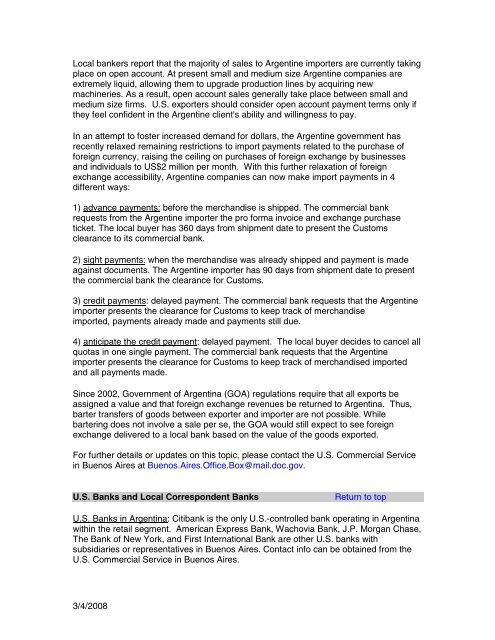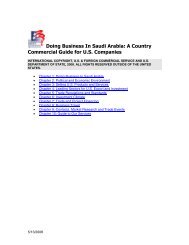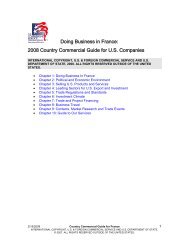Create successful ePaper yourself
Turn your PDF publications into a flip-book with our unique Google optimized e-Paper software.
Local bankers report that the majority of sales to Argentine importers are currently taking<br />
place on open account. At present small and medium size Argentine companies are<br />
extremely liquid, allowing them to upgrade production lines by acquiring new<br />
machineries. As a result, open account sales generally take place between small and<br />
medium size firms. U.S. exporters should consider open account payment terms only if<br />
they feel confident in the Argentine client's ability and willingness to pay.<br />
<strong>In</strong> an attempt to foster increased demand for dollars, the Argentine government has<br />
recently relaxed remaining restrictions to import payments related to the purchase of<br />
foreign currency, raising the ceiling on purchases of foreign exchange by businesses<br />
and individuals to US$2 million per month. With this further relaxation of foreign<br />
exchange accessibility, Argentine companies can now make import payments in 4<br />
different ways:<br />
1) advance payments: before the merchandise is shipped. The commercial bank<br />
requests from the Argentine importer the pro forma invoice and exchange purchase<br />
ticket. The local buyer has 360 days from shipment date to present the Customs<br />
clearance to its commercial bank.<br />
2) sight payments: when the merchandise was already shipped and payment is made<br />
against documents. The Argentine importer has 90 days from shipment date to present<br />
the commercial bank the clearance for Customs.<br />
3) credit payments: delayed payment. The commercial bank requests that the Argentine<br />
importer presents the clearance for Customs to keep track of merchandise<br />
imported, payments already made and payments still due.<br />
4) anticipate the credit payment: delayed payment. The local buyer decides to cancel all<br />
quotas in one single payment. The commercial bank requests that the Argentine<br />
importer presents the clearance for Customs to keep track of merchandised imported<br />
and all payments made.<br />
Since 2002, Government of <strong>Argentina</strong> (GOA) regulations require that all exports be<br />
assigned a value and that foreign exchange revenues be returned to <strong>Argentina</strong>. Thus,<br />
barter transfers of goods between exporter and importer are not possible. While<br />
bartering does not involve a sale per se, the GOA would still expect to see foreign<br />
exchange delivered to a local bank based on the value of the goods exported.<br />
For further details or updates on this topic, please contact the U.S. Commercial Service<br />
in Buenos Aires at Buenos.Aires.Office.Box@mail.doc.gov.<br />
U.S. Banks and Local Correspondent Banks Return to top<br />
U.S. Banks in <strong>Argentina</strong>: Citibank is the only U.S.-controlled bank operating in <strong>Argentina</strong><br />
within the retail segment. American Express Bank, Wachovia Bank, J.P. Morgan Chase,<br />
The Bank of New York, and First <strong>In</strong>ternational Bank are other U.S. banks with<br />
subsidiaries or representatives in Buenos Aires. Contact info can be obtained from the<br />
U.S. Commercial Service in Buenos Aires.<br />
3/4/2008












